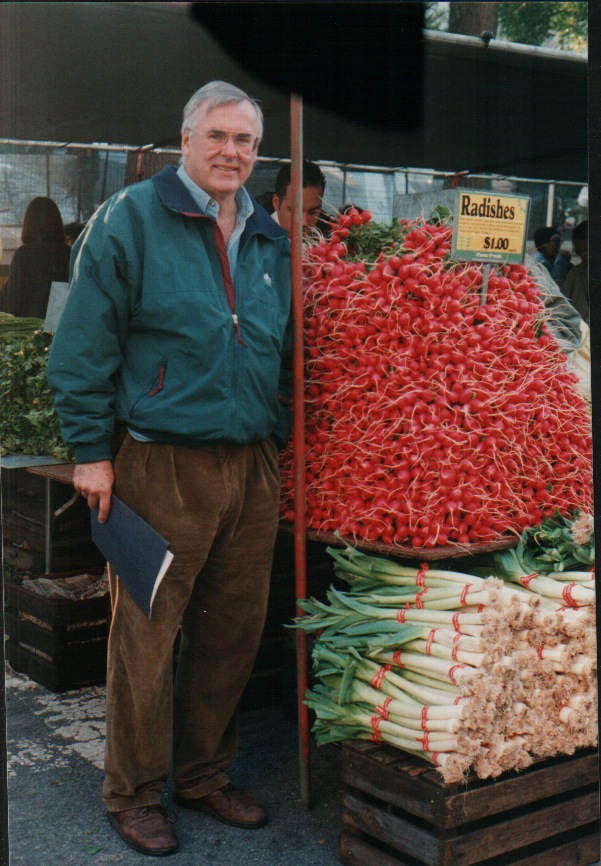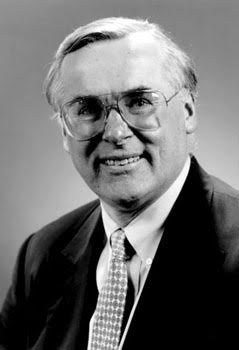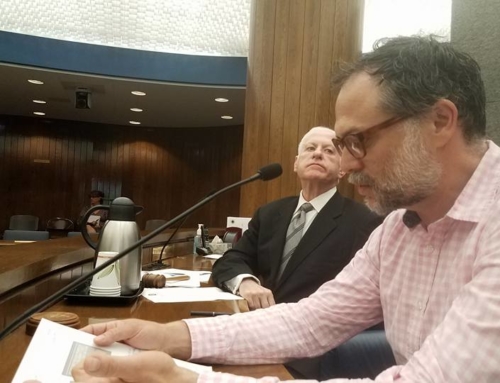2017 Good Food Policy Hero
“The widescale impact Gus had on improving the ability of low-income populations to afford, buy, and consume healthy fruits and vegetables, is an undeniable legacy.”
Michel Nischan, Founder and CEO, Wholesome Wave
In Tribute to Gus Schumacher
by Paula Daniels
The Boston accent. The well knotted tie. The V-neck sweater. The persistent rose in his cheeks, as if through daily inspiration from the farm field or the fishing boat. The joyful nostalgia with which he slid onto the bar stool at the Union Oyster House, the gleeful slap on the counter, the ramp up of the accent as he asked with particular knowledge about the quality of the clams from this or that part of the bay, that day. The cheerful glow in his humbly handsome face at the only-between-us-Bostonians banter from the bartender who never looked up from the shucking of oysters as he gave Gus the special report.
It was 2012 but I felt the best of American history wash into me in that moment, in that particular place, with that particular escort. The history of any country is complicated by its proportion of heroism and villainy, its selflessness or selfishness, its wisdom or its wantonness. Gus Schumacher was among those who brought the equation into its better balance.
He was an American classic in the 20th Century sense of its meaning. An Olympic athlete, a first-in-his-family-exceptionalism in higher education, a generational experience of farming. A good part of his youth spent delivering eggs to the central marketplace near Faneuil Hall when it was, simply, a public produce market.
This is the hall where the American revolution began, he told me from between the pews of the Old South Meeting Hall, beaming with a deeply imbued sense of purpose and possibility, arms outstretched at the sweep of history from there to here, where he and I were standing in the 21st Century moment of a new spin on the dial of change. A sense of progress, to which his arms were also widely outstretched to embrace.
The V-neck sweater, the tie; a face from a Norman Rockwell painting. An American classic. And, a thoroughly modern man, ever pushing the boulder of progress forward with every force of his extensive charm.
He was agriculture commissioner in Massachusetts, administrator of the Foreign Agriculture Service, USDA Undersecretary, a driving force at the nonprofit Wholesome Wave. Over 25 years ago he wedged the farmers market nutrition program into the Women and Infant Children program and it is now $6 billion strong across the country. He created a similar program for seniors and then the signature initiative for a market match for a food stamp recipient to enable their purchase of produce at farmer’s markets. His list of accomplishments was longer than that. At a time when most men who rotated through a steady supply of v-neck cardigans would retire, he was inspiring and supporting many other innovative enterprises directed at bettering our food system. And, he was mentoring a group of it-just-so-happened-to-be-women who were part of a new wave of food policy progress, as food policy staff to mayors who were willing to commit their time in office to the transformative potential of embedding community based values into the food system.
The list of Gus’s accomplishments is long. But it rarely goes on a typical resume that he was gracious, and kind; he had an indefatigable cheerfulness; he was aware, and mindful; he understood, he cared, he cultivated and mentored in the most unassuming possible way. He taught without teaching. Although he lived for decades in DC, he was a Bostonian, also in the sense of the way that Massachusetts was the first state to abolish slavery, the first place in the US to establish a college, the state constitution on which the one for our country was modeled. In the way of Atticus Finch: he tried. And in the way of Gus Schumacher: he succeeded.



